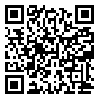1. Seighali F, Fallahi M, Farahani Z. The effect of breastfeeding workshop on attitude, knowledge and practice of participants. Razi Journal of Medical Sciences. 2014; 21(118):92-101.
2. Jafari Asl M, Fadakar Sogheh R, Ghavi A, Ahmad Shear Bafi M. Related factors to continued breastfeeding in infants. Journal of Holistic Nursing and Midwifery. 2013; 24(2):1-8.
3. Demirtas B. Strategies to support breastfeeding: a review. International Nursing Review. 2012; 59(4):474-81. [
DOI:10.1111/j.1466-7657.2012.01017.x] [
PMID]
4. Abdollahipour F, Nouhjah S, Latifi SM, Araban M. The impact of applying the breast crawl (TBC) with other educational strategies on breastfeeding self-efficacy after the first breastfeeding among primiparous women in Dezful, Iran. Journal of Health Education and Health Promotion, 2017; 5(1):20-32. [
DOI:10.18869/acadpub.ihepsaj.5.1.20]
5. Mirmohamad Ali M, Bahiraee A, Rahimi A, Hashemzadeh M, Sohrabi N, Sohrabi Z. Effect of educational package on breastfeeding self-efficacy in postpartum period. Journal of the Iranian Institute for Health Sciences Research. 2014; 13(2):221-8.
6. Abdeyazdan Z, Elahi T, Golshiri P. Comparison of an empowering breastfeeding program before and after childbirth on exclusive breastfeeding time span. Modern Care, Scientific Quarterly of Birjand Nursing and Midwifery Faculty. 2015; 11(4):330-8.
7. Parsa P, Boojar A, Roshanaei G, Bakht R. The effect breastfeeding counseling on self-efficacy and continuation breastfeeding among primiparous mothers: a randomized clinical trial. Scientific Journal of Hamadan Nursing & Midwifery Faculty, 2016; 24(2):98-104.
8. Carlson Bowles B. Promoting breastfeeding self-efficacy: fear appeals in breastfeeding management clinical lactation. Clinical Lactation. 2011; 2(1):11-4. [
DOI:10.1891/215805311807011782]
9. Moafi F, Hajnasiri H, Hosseini T, Alimoradi Z, Bajalan Z. Breastfeeding self-efficacy and its associated factors in women who gave birth in Kosar Hospital of Qazvin in 2016-2017: A descriptive study. Journal of Rafsanjan University of Medical Sciences, 2019; 17(11):1003-16.
10. Sinsuksai N, Nuampa S, Chanprapaph P. Factors predicting 6-month-exclusive breastfeeding in mothers with cesarean section. Journal of Nursing Science. 2017; 35(1):14-22.
11. Capurro D, Cole K, Echavarría MI, Joe J, Neogi T, Turner AM. The use of social networking sites for public health practice and research: a systematic review. Journal of Medical Internet Research. 2014; 16(3):e79. doi: 10.2196/jmir.2679 [
DOI:10.2196/jmir.2679] [
PMID] [
PMCID]
12. O'Brien SJ. Facebook and other internet use and the academic performance of college students. Philadelphia: Temple University; 2011.
13. Moghaddam F, Norouzi S, Sharafi F. Explore Experiences Students of Social Networks and Their Impact on Lifestyle. Iranian Journal of Nursing Research. 2016; 11(3):66-73.
14. Fatehi F, Malekzade G, Akhavimirab A, Rashidi M, Afkhami Ardekani M. The effect of short message service on knowledge of patients with diabetes in Yazd, Iran. Iranian Journal of Diabetes and Obesity. 2010; 2(1):27-31.
15. Kohan S, Heidari Z. The effect of family-oriented educational-supportive programs on adequacy of exclusive breastfeeding from the perspective of mothers. Journal of Babol University of Medical Sciences, 2017; 19(1):53-8.
16. Araban M, Falahiyan Mehrjardi F, Shahry P, Montazeri A. The Persian version of Breastfeeding Self-Efficacy Scale-Short Form (BSES-SF): translation and psychometric assessment. Payesh, 2016; 15(1):87-93.
17. Kazemi Majd R, Hosseini MA, Hadi Safi M, Norouzi K, Hoseinzadeh S. The effect of self-care education based on short message service on self-efficacy and adherence to the medication regimen in adolescents with epilepsy referred to Iran Epilepsy Association of in 2016. Journal of Nursing Education. 2017; 4(3):48-54.
18. Karimian Kakolaki Z, Eslami AA, Gerayllo S, Heidari F, Safari Hajataghaie S, Behzadi Goughari S. Effect of education using the virtual social networks on promoting women's self-efficacy in preventing osteoporosis. Journal of Education and Community Health. 2018; 5(3):57-62. [
DOI:10.21859/jech.5.3.57]
19. Azhari S, Baghani R, Akhlaghi F, Ebrahimzadeh S, Salehi Federdi J. Comparing the effect of hands - on and hands off breastfeeding methods on self - efficacy in primiparous mothers. Journal of Sabzevar University of Medical Sciences and Health Services. 2011; 17(4):248-55.
20. Noel-Weiss J, Bassett V, Cragg B. Developing a prenatal breastfeeding workshop to support maternal breastfeeding self-efficacy. Journal of Obstetric, Gynecologic, and Neonatal Nursing. 2006; 35(3):349-57. [
DOI:10.1111/j.1552-6909.2006.00053.x] [
PMID]
21. Aghdas K, Talat K, Sepideh B. Effect of immediate and continuous mother-infant skin-toskincontact on breastfeeding self-efficacy of primiparous women: a randomised control trial. Women and Birth. 2014; 27(1):37-40. doi: 10.1016/j.wombi.2013 [
DOI:10.1016/j.wombi.2013.09.004] [
PMID]
22. Kuo SC, Chen YS, Lin KC, Lee TY, Hsu CH. Evaluating the effects of an Internet education programme on newborn care in Taiwan. J Clin Nurs 2009 Jun;18(11):1592-601. [
DOI:10.1111/j.1365-2702.2008.02732.x] [
PMID]
23. Karen A. A pilot randomized controlled trial of a breastfeeding self-efficacy. Journal of Obstetric, Gynecologic, & Neonatal Nursing. 2010; 40(1):35-46. [
DOI:10.1111/j.1552-6909.2010.01210.x] [
PMID]
24. Özkan H, Polat S. Maternal identity development education on maternity role attainment and my baby perception of primiparas. Asian Nursing Research. 2011; 5(2):108-17. [
DOI:10.1016/S1976-1317(11)60019-4]
25. Perez-Blasco J, Viguer P, Rodrigo MF. Effects of a mindfulness-based intervention on psychological distress, well-being, and maternal self-efficacy in breast-feeding mothers: results of a pilot study. Archives of Women's Mental Health. 2013; 16(3):227-36. [
DOI:10.1007/s00737-013-0337-z] [
PMID]
26. Svensson J, Barclay L, Cooke M. Randomised-controlled trial of two antenatal education programmes. Midwifery. 2009; 25(2):114-25. [
DOI:10.1016/j.midw.2006.12.012] [
PMID]
27. Otsuka K, Dennis CL, Tatsuoka H, Jimba M. The relationship between breastfeeding self‐efficacy and perceived insufficient milk among Japanese mothers. Journal of Obstetric, Gynecologic, & Neonatal Nursing. 2008; 37(5):546-55. [
DOI:10.1111/j.1552-6909.2008.00277.x] [
PMID]
28. McQueen KA, Dennis CL, Stremler R, Norman CD. A pilot randomized controlled trial of a breastfeeding self-efficacy intervention with primiparous mothers. Journal of Obstetric, Gynecologic, & Neonatal Nursing. 2011; 40(1):35-46. [
DOI:10.1111/j.1552-6909.2010.01210.x] [
PMID]







 gmail.com
gmail.com